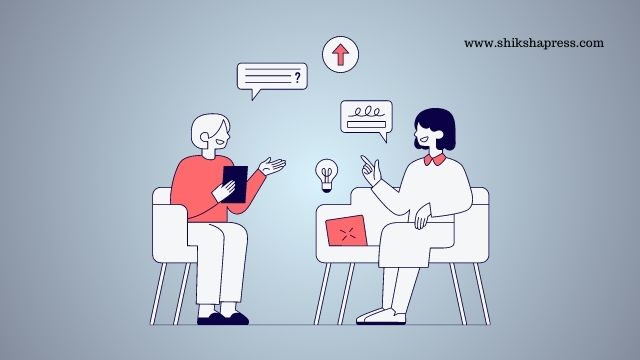Preschool Teacher Interview Questions and Answers: For many aspiring primary school teachers, the interview process can be a daunting experience. Knowing your craft is one thing, but presenting it effectively during an interview is another.
Building on the success of previous interview preparation posts, this blog post focuses exclusively on questions faced during primary teacher interviews. So, if you’re an educator gearing up for that all-important interview, read on.
Here are 10 basic interview questions for a Preschool Teacher position:
- What inspired you to become a preschool teacher?
- How would you describe your classroom management style?
- How do you handle a child who refuses to participate in a group activity?
- Can you describe a typical day in your classroom?
- How do you communicate with parents about their child’s progress?
- What tools or resources do you use to plan your lessons?
- How do you address different learning styles in your classroom?
- What strategies do you use to foster social skills in young children?
- How do you handle conflicts between children in your class?
- What’s your favorite part about teaching preschoolers?
1. Why do you believe you’d be a great primary teacher?
To thrive in primary education, a teacher needs more than just knowledge. Building strong relationships with both students and their parents is paramount. Moreover, genuine passion for teaching often results in better outcomes for the students.
2. Why have you chosen our school for your teaching journey?
It’s essential to demonstrate that you’ve researched the school before attending the interview. Highlighting the school’s reputation and aligning its values with your personal and professional standards can create a favorable impression.
3. Isn’t primary teaching challenging?
While primary teaching comes with its set of challenges, it’s essential to view them as opportunities rather than obstacles. Emphasizing your commitment and readiness to face these challenges can showcase your dedication.
4. How would you handle mischievous students?
Addressing classroom challenges, such as handling naughty students, requires innovative and dynamic teaching methods. Incorporating engaging stories, games, and hands-on learning can keep the classroom environment vibrant and minimize disruptions.
5. Describe a successful lesson.
Two crucial elements define a successful lesson: student engagement and achieving the set learning outcomes. When children enjoy the learning process, they are more likely to absorb and retain information.
6. What challenges frustrate you in primary teaching?
Being transparent about challenges, like when students aren’t participative, shows authenticity. However, it’s also important to emphasize proactive strategies to overcome these challenges.
7. What are your strengths and areas of improvement as a teacher?
It’s always beneficial to relate personal experiences, like being a parent, to your teaching strengths, such as patience. At the same time, being candid about areas for improvement, like a preference for traditional teaching methods, shows self-awareness.
8. How does discipline impact student learning?
Discipline in the classroom is pivotal for effective learning. Using positive reinforcement strategies, providing constructive feedback, and acknowledging positive behavior can foster discipline while maintaining a nurturing environment.
9. Why are you passionate about working with children?
Personal anecdotes, like the influence of your third-grade teacher, can provide a heartfelt response. Recalling experiences that led you to teaching can resonate deeply during an interview.
10. How do you motivate your students?
Every student is unique, and so are their motivators. Whether it’s through rewards like candies, stickers, or badges, or through other means, it’s crucial to recognize and celebrate positive behavior in the classroom.
11. Summarize your teaching philosophy for the primary section.
A teaching philosophy should reflect your core beliefs about education. Prioritizing a student-centric approach, creating a safe learning environment, and balancing structured and free play can set a positive tone.
Acing the Preschool Teacher Interview: Tips and Insights

Being a preschool teacher is no walk in the park. If you’ve ever assumed that it’s all about the ABCs or 123s, think again. An ideal candidate for this role is passionate about educating young minds and genuinely enjoys spending time with children.
Next, I’ve compiled some of the most commonly asked questions during preschool teacher interviews, along with insights on how best to answer them.
1. Introduce Yourself and Your Interest in the Profession
“I’m [Your Name], hailing from [Your City]. Holding a bachelor’s degree in early childhood education, I bring passion, motivation, and patience to the table. I’ve always been drawn to this profession, recognizing the balance of care and education required to help young minds grow.”
2. Key Responsibilities of a Preschool Teacher
It’s not just about teaching letters or numbers. A preschool teacher instills core values like love for learning, curiosity, discipline, and teamwork. They are responsible for promoting physical, mental, academic, and social development in each child.
3. The Importance of Documentation
From attendance records, meal plans to lesson plans, and class activities, maintaining accurate and up-to-date paperwork is crucial.
4. What Successful Lesson Plans Entail
All my lesson plans are structured to promote overall development. Each child is unique, so activities are tailored according to their individual coping abilities.
5. The Significance of Early Years
The first five years of a child’s life lay the foundation for their future. It’s a critical period where they develop skills and values that stay with them for decades.
6. The Joys of Preschool Teaching
The sheer joy and excitement in a child’s eyes upon learning something new, coupled with the opportunity to shape their personalities, make this job immensely rewarding.
7. Juggling Classroom Activities
Balance is the key. By incorporating both indoor and outdoor activities, along with hands-on and listening exercises, I ensure that learning is always fun for the kids.
8. Tackling Challenges and Embracing Responsibility
Yes, being a preschool teacher is challenging. We’re moulding lives. But with passion and commitment, it’s a challenge worth accepting.
9. My Teaching Philosophy
Safety and support are paramount. A structured yet flexible approach, where children feel secure, results in a more effective learning environment.
10. Handling Behavioral Issues
Understanding and patience are crucial. Approaching a child calmly, understanding the reason behind their behavior, and guiding them towards the right response, lays the groundwork for a nurturing relationship.
11. On Inclusive Education
Every child’s ability varies. If enrolling a student with special needs into a regular program doesn’t traumatize them, it’s beneficial for their growth.
12. Strengths as a Preschool Teacher
Planning, organization, communication, dedication, flexibility, creativity, and above all, patience, are my major strengths in this role.
13. Fostering a Happy Learning Environment
Being attuned to each child’s needs and incorporating engaging activities ensures they remain active and eager throughout school hours.
14. My Journey as a Preschool Teacher
After obtaining my degree, I joined a missionary school and gathered invaluable experience over the years. Today, I feel equipped and passionate about contributing to early childhood education.
15. Why This Career?
Considering my strengths, patience, and ability to bond with children, I’ve always seen preschool teaching as the best career choice for me.
If you’re venturing into the realm of preschool teaching or preparing for an interview, remember that it’s all about showcasing your passion and understanding of young minds. Equip yourself with knowledge, and always approach the job with love and patience. The future lies in the hands of the little ones, and as educators, we have the privilege to shape it.

1. Tell Me About Yourself
2. Why are You Interested in this Role?
3. What are the Roles of a Preschool Teacher?
4. Briefly Describe Your Preschool Teaching Experience?
5. Why is it Important to You to Work as a Preschool Teacher?
6. Isn’t Teaching Young Children Very Challenging?
7. What Skills Make You a Great Preschool Teacher?
8. What Approach Do You Use to Manage Learners When They Become Distractive?
9. What Qualities Should a Preschool Teacher Possess to be Effective?
10. What Major Challenge Did You Face During Your Last Role? How Did You Handle It?
11. Describe Your Daily Routine as a Preschool teacher
12. What is the Biggest Challenge that You Foresee in This Job?
13. What is the Aim of Preparing Lesson Plans?
14. Is it Okay to Enrol Learners with Special Needs in a Regular Program?
15. What Do You Like Most About This Job?
16. What Kind of Strategies and Mind-Set is Required for This Role? Explain With Example
17. Why are the First Five Years of a Child’s Life So Important? 18. What are Your Strengths as a Preschool Teacher?
19. How Do You Stay Motivated at Work?
20. Describe a Time You Failed in This Role and the Lesson You Learned
Source: ProjectPractical Youtube Channel.
List of 30 interview Questions for a Preschool Teacher Position.
Why did you choose to become a preschool teacher?
How do you handle classroom discipline?
Describe a lesson plan that you recently implemented.
How do you incorporate play into your teaching style?
How do you address different developmental stages in your classroom?
What strategies do you use to engage an uninterested child?
How do you handle a child with special needs?
How would you deal with a child who is consistently disruptive?
Describe your communication style with parents.
How do you handle feedback from parents?
What’s the most challenging aspect of teaching preschoolers, and how do you overcome it?
How do you incorporate cultural diversity in your lessons?
Describe a time when you had a disagreement with a colleague and how you resolved it.
How do you keep up with current teaching strategies and methodologies for early childhood education?
How do you assess a child’s developmental progress?
What role does technology play in your classroom?
How do you foster creativity in children?
How do you support children during transitions (e.g., from playtime to learning time)?
Describe an instance where you identified a child’s specific learning need and adapted your teaching approach.
How do you create an inclusive classroom environment?
What are your views on classroom collaboration vs. independent learning at this age?
How do you handle a situation where a child is struggling with separation anxiety?
What books or resources have influenced your teaching style the most?
How do you handle emergencies or unexpected situations in the classroom?
Describe your approach to teaching reading and math skills to preschoolers.
How do you support children’s emotional development?
How do you integrate music, art, and movement into your curriculum?
What do you believe is the most important skill for a preschooler to develop?
How do you approach parent-teacher conferences?
Why are you interested in working at this particular preschool?
Remember, the goal of these questions is to get a comprehensive understanding of the teacher’s skills, philosophy, and adaptability in various situations.
Conclusion
Primary teaching is a unique blend of challenges and rewards. While interviews can seem intimidating, being prepared can make all the difference. Remember, understanding the “rules” of the interview game equips you to play it effectively.
For those looking to further their preparation we offers invaluable insights. Dive deep into each title to find the ones that best suit your needs, ensuring you’re well-prepared to make a lasting impression in your next interview.
Summary: This post delves into the top questions and answers for primary teacher interviews, emphasizing relationship-building, passion for teaching, school values, classroom management, and teaching philosophies.
Call to Action: Share this guide with fellow educators, and don’t forget to explore our website for comprehensive interview preparation. Best of luck, and happy teaching!
CBSE Sample Papers | CBSE Circulars | Quizzes | Study Material
Click Here to Join our Premium Telegram for More News and Updates.
For the Latest Educational News (CBSE, ICSE, and State Board News) and live news updates, like us on Facebook or follow us on Twitter and Join our Premium Telegram Channel. Read more on Latest Exams & Results News on Shikshapress.com.

